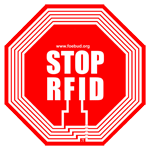Technics
For those who like to know some technicalities we have put together a handful of technical specifications here - always trying to keep it simple and understandable.
Zum deutschen Text gehts hier lang.
Many questions about the technical side are answered in our FAQ.
A collection of technical counter measures against RFID can be found under "What can I do?"
A number of simple explanations are can be found on the pages of an RFID-printing firm (in German): http://www.barcode-fonts.de/
Technical standards of RFID
- ISO 14443: The chips under this norm emit at a frequency of 13.56 MHz. They are used e.g. in retailing, in libraries, on stadium tickets and in passports. Their reading range lies between 3 and 5 inches (10-15 cm). Some sources talk of ranges up to 5 feet (1.5 m), if the readout antennas are pitched to very high sensitivity, but we have as yet not been able to verify this. You can tune a simple short wave radio to this frequency and so detect reading devices - the radio will then receive static noise that sounds somewhat like the noise you get when you hold a mobile phone near a loudspeaker.
- ISO 11784: Chips under this norm emit at 134.2 kHz and are used for animal identification (livestock and pets). This norm specifies a 15-digit code structure which ensures that every individual number will be given out only once. Reading range here is a maximum 6 inches (18 cm).
- ISO 11785: This norm specifies the unified reading functions for ISO 11784.
Technical problems with RFID
Saith the RFID-Lobby:
"Do you know how much data we would be collecting if we wanted to set up movement profiles via RFID? Who do you think should be able to handle such masses of data?"
FoeBuD's counter question:
"You've heard of Google?" As if handling of data masses were a problem...
Everything that doesn't yet work acts as an argument of the lobby to play down the dangers. Trust the industry: These problems WILL be solved, and until then we have to do something!
For the time being a number of problems with liquids and metal aren't yet solved. Both hamper the error-free readout of RFID, which is responsible for instance for the vision of simply pushing your shopping cart through checkout not being reality yet. In the trial shelves at the Future Store there are always only a few shampoo bottles standing behind each other, so obviously the readers can't handle more. This is also why metal envelopes help against being read out involuntarily.
And should you now be of the opinion that the whole danger of RFID can be averted when you slip your bugged passport or whatever into a metal case - this requires, of course, that you know which items you carry with you contain an RFID chip. (Some examples can be found under our heading "Where do I find RFID?") A chip in your coat sleeve or in the soles of your shoes is not so easily wrapped in a metal cover...
You can purchase metal cases for customer cards, chipped credit cards and the like in in our shop, among others. All proceeds from the shop go directly into our work.
2006-12-28 19:50



